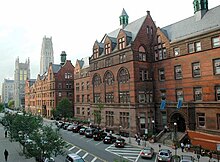New College, Teachers College, Columbia University

Teachers College, view down West 120th Street
|
|
| Type | Private |
|---|---|
| Established | 1932 |
| President |
Dr. (Richard) Thomas Alexander, 1932-1938 Dr. Donald Tewksbury, 1938-1939 |
|
Academic staff
|
124 (1932-1939) |
| Students | 739 (1932-1939) |
| Location | New York City, New York, USA |
| Campus | Urban |
| Website | www.tc.columbia.edu |
Dr. (Richard) Thomas Alexander, 1932-1938
New College for the Education of Teachers (or simply New College) was a progressive undergraduate college under the auspices of Teachers College, Columbia University that existed from 1932 to 1939. The college was located in New York City. It used the same facilities as Teachers College at the Morningside Heights campus. The college also had learning communities established in North Carolina, Georgia, and abroad in foreign study groups. Using innovative ideas such as extended foreign study, community-based active research, and authentic assessment, a portfolio-based undergraduate learning curriculum was developed which rejected traditional summative grades or the accumulation of credits as the basis of degree completion. This was truly a "learn by doing" experience. The college was closed due to a combination of growing financial deficits and student activism in 1939.
New College was established in 1932 under the leadership of Dr. (Richard) Thomas Alexander (1887-1971). New College, as it became known, was originally designed to operate as an undergraduate college level unit granting a Bachelor of Science and/or a Master’s degree after a period of study from three to five years. It was to serve the dual purpose of preparing young people for teaching positions in elementary and secondary grades and of affording a demonstration college for graduate students in Teachers College. Students would ultimately become professors in colleges and universities with teacher training programs.
The nationally acclaimed New College would close within seven years under the pretext of financial hardship over the protestations of some of the country’s leading academic, political, and social figures of the era. In reality, the school was closed because the students followed the ideals of the New College program which promoted participation in the creation of a “new social order” at the grassroots classroom level using the Concept of Community as a framework. Students were taught to solve the problems they encounter in society seeking solutions for the betterment of their students and community. Sometimes the solutions would put them at odds with powers that be, which preferred the status quo. The educational philosophies of New College, developed by Alexander, encouraged students to think critically, solve problems, and later, question the ruling hegemony and the status quo of the dominant social structure. The examination and analysis of the "Persistent Problems of Living", the "Concept of Community", and the creation of a "New Social Order" served as the philosophical springboard for action, steered by those social and economic conditions of the times.
...
Wikipedia
